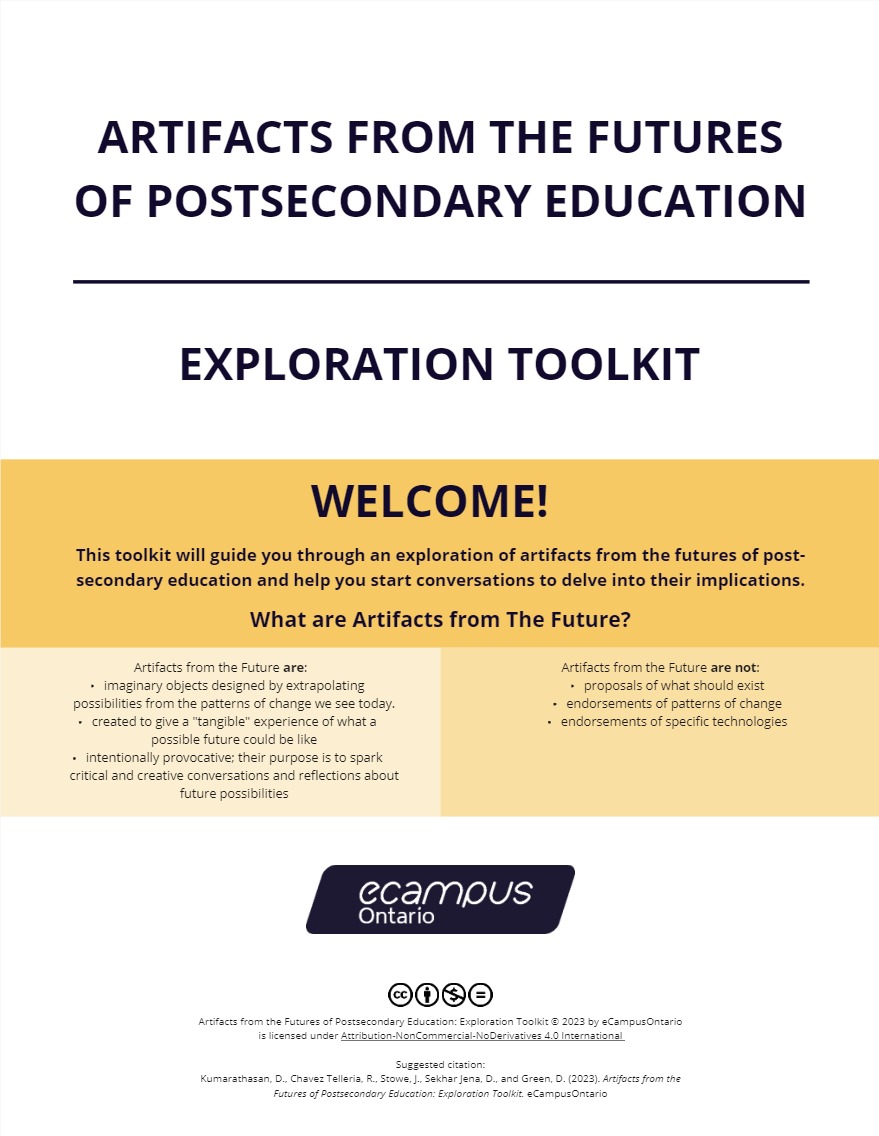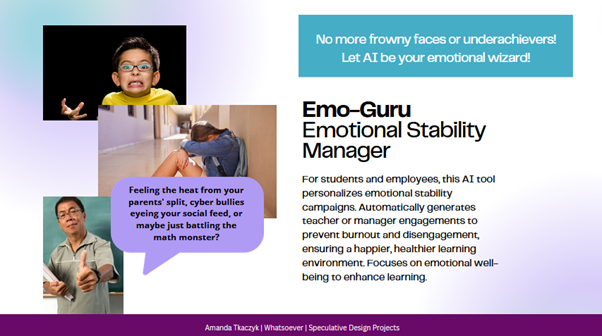
Artifacts from the Futures of Higher Education
Authors: Elisa Arnold, eCampusOntario Laura Viselli, eCampusOntario Thinking about the long-term future can be challenging. It can be too abstract or ambiguous. The possibilities of what may happen can be just as exciting as they are overwhelming, and navigating between those extremes is complex. Human beings have the capacity for futures thinking. We have the imagination and creativity to do so, and it is likely that we are already doing it in some form. It is often our own barriers, like our preconceived notions of the future, societal structures, or our own experiences, that prevent us from engaging in futures thinking. As Maree Conway remarks, “using our imaginations to explore possible futures is something we can all do, as long as we accept that the ‘unimaginable’ is a construct of our times” (113). Engaging in long-term thinking exercises is essential because the choices we make today will shape the possible […]

The AI-Assisted Design of Learning Experiences for Echoborgs: Practical Concerns & Speculative Considerations
Author: Amanda Tkaczyk, MMAI, CIPP/C, CIPT My Positionality I have a master’s degree in Artificial Intelligence. I have advised, consulted, and built applied AI projects. I am deeply concerned about the environmental, social, emotional, and equity harms of AI, especially with poor regulation, enforcement, and oversight. It can be overwhelming to bring together each of these themes, so any oversight is not due to lack of care. I am enthusiastic about the potential of AI to improve healthcare and food security. I proceed with caution in my personal use of AI tools. I also fully recognize I cannot directly control or police how anyone else uses these tools. Two Moments That Sparked My Project Motivation In Spring 2023, I had experiences in the classroom where students chose to present AI-generated text, on AI-generated slides, with AI-generated data, and AI-generated scripts. I felt defeated as an educator. While recognizing their autonomy […]

Speculative Design in a Summer Camp: Tensions around Infantilization
Authors: Madalyn Wilson-Fetrow, University of New Mexico Vanessa Svihla, University of New Mexico Authors’ Note: This blog contains the exploration of the use of dark themes in ideation, including natural disasters, gun violence, and poverty. Why would you design a doghouse with rotating blades for walls? Design fixation, or the process of being taken with and sticking to your first idea, even if it isn’t a particularly good one, plaguing novice designers and requiring consideration from experienced designers. Activities that are intended to increase creativity during the ideation process often reduce empathy (because of the emphasis on unique ideas); conversely, focusing on human-centered ideas exclusively generates fewer and less diverse ideas. This sets up a natural tension for designers who have to make decisions about how they should approach ideation. It becomes an even more critical tension for instructional designers who are themselves facilitating design work. These facilitators, with their […]

Leveraging Speculative Design for Transformative Organizational Change in Higher Education
Authors: Kristen Ferris , The University of New Mexico Vanessa Svihla, The University of New Mexico Susannah Davis, The University of New Mexico Nadia Kellam, The Arizona State University In the ever-evolving landscape of higher education, the pursuit of diversity, equity, inclusion, and justice (DEIJ) remains a formidable challenge. Despite the earnest efforts of change agents, organizational transformations often stumble upon complex barriers rooted in entrenched power dynamics. Amidst these challenges, we use speculative design narratives, which intentionally critique the present, to build commitment to making change even when faced with challenges and barriers. Speculative design is often used as a design practice aimed at exploring and questioning potential futures (Dunne & Raby, 2013). We created a Community of Transformation (CoT) comprising change agents from STEM departments across various institutional change leadership teams, drawing on speculative design, remixing, and futurisms to foster DEIJ-oriented systems change within higher education. Our aim […]